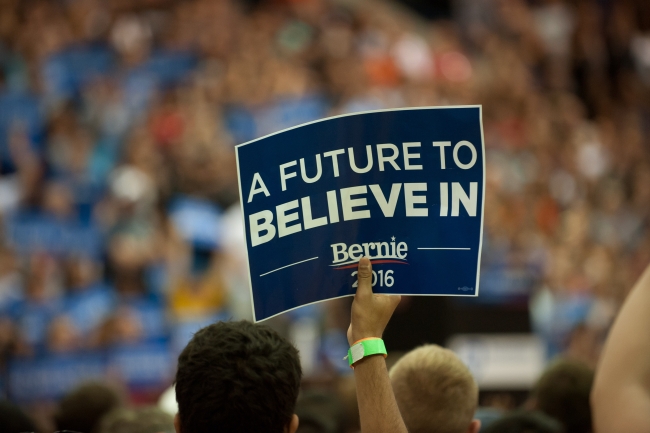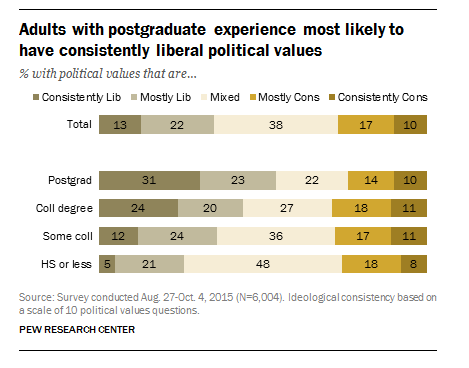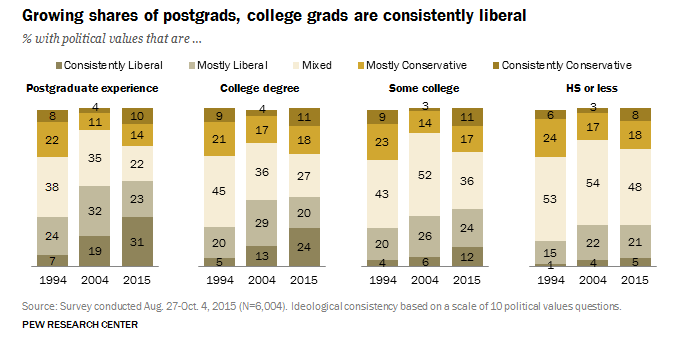You have /5 articles left.
Sign up for a free account or log in.

Getty Images
Americans with college degrees are to the left of the majority of Americans who lack a college degree. And a new study by the Pew Research Center shows that those who have attended graduate school are even farther to the left than those who have only an undergraduate degree.
The relationship between education levels and politics isn’t modest, but it is significant, the study found.
Among those with graduate education of some form, 31 percent hold consistently liberal positions based on an analysis of their opinions about the role and performance of government, social issues, the environment and other topics. Another 23 percent hold mostly liberal positions. Only 10 percent hold consistently conservative positions, and 17 percent hold mostly conservative positions.
As the bar chart below shows, there is a clear pattern in which those with more education are more liberal.
While the findings may have implications for understanding the relative liberalism of academics, nearly all of whom have graduate degrees, it is important to note the findings are of all people with at least some graduate education, and so would include many people with graduate education who work as lawyers or health professionals or in any number of fields outside academe.
The idea of the liberal educated elite is also, of course, hardly new. And many past studies have suggested that academics or others who are highly educated may be to the left of other Americans.
But the new study shows that this ideological gap by education is growing -- and doing so at a time when American society is becoming more politically polarized.
As the table below shows, those with graduate education (or with college degrees) have long been more liberal than others. But the growth in the percentage of those holding consistently liberal views has been considerable.
In 1994, the share of those with graduate education who held consistently liberal views was 7 percent (compared to today’s 31 percent). The share with mostly or consistently liberal views was 31 percent (compared to today’s 54 percent).
While all levels of educational attainment saw gains in those holding liberal views, those increases were not as large.
Neil L. Gross, the Charles A. Dana Professor of Sociology at Colby College, has conducted extensive research on the political views of academics, generally finding them more liberal than average for Americans, but not as left leaning as stereotype would suggest.
He said via email that the Pew analysis could shed light on some key questions. “For some time there was legitimate debate about whether polarization was just an elite phenomenon -- something happening in Congress and among politicos -- or whether it was affecting ordinary Americans as well,” he said. “I think the weight of the evidence now indicates there’s been ‘mass’ polarization too.”
Gross said it was “not a huge surprise that the highly educated would be in the vanguard of this. Those with more education have for many decades shown more consistency in their ideological views: they’re better positioned to figure out exactly where they stand in relation to the parties, and expected to take stances that line up. It’s also not a surprise that the movement in recent decades among the highly educated has been toward ideological consistency on the left. The evidence doesn’t show that exposure to higher education turns Republicans into Democrats, but it does seem to make people somewhat more cosmopolitan, more comfortable with social diversity, more tolerant of social difference.”
He added that recent political trends have also likely had an impact. “That the GOP has lurched right means that fewer people with graduate degrees are going to back it, or line themselves up with conservative positions generally. The party is also widely perceived by the highly educated as anti-science and anti-higher education -- a tarnished political brand.”
Then there is the issue of why the professoriate is or is perceived to be liberal, and whether the data shed light on the idea that it’s hard for conservative academics to land jobs.
Gross noted that the Pew data are not on academics alone and so cannot be conclusive on any of these questions. Still, he said that the study (compared with data on professors’ politics) suggests that the pool of potential academics leans strongly to the left. This means that “it doesn’t look to me from these numbers that those on the left are being massively favored for academic posts relative to the distribution of liberals and conservatives in the postgraduate pool.”
At the same time, he said, “that’s not to say there isn’t any bias, of course.”






